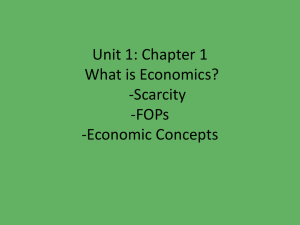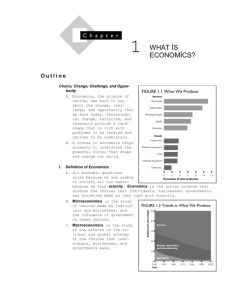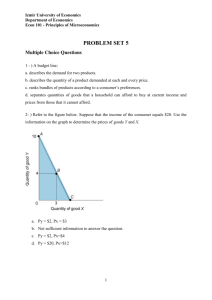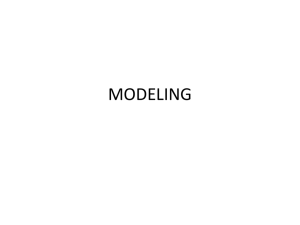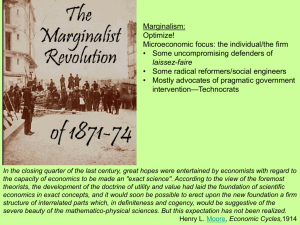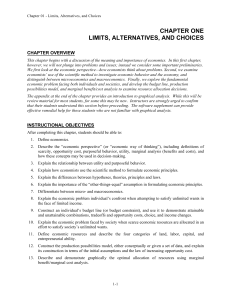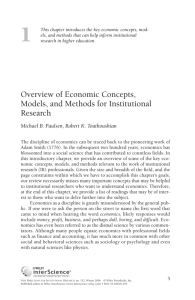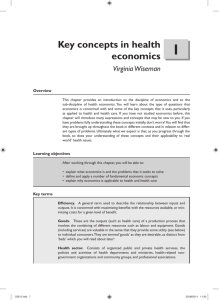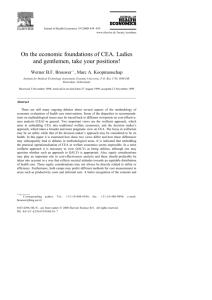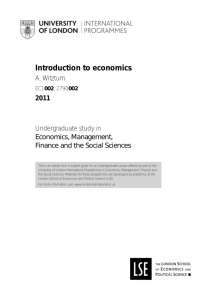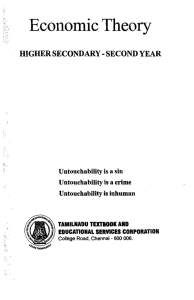Economics Vocabulary Review-Chapter 1 & 2 Vocabulary Word
advertisement
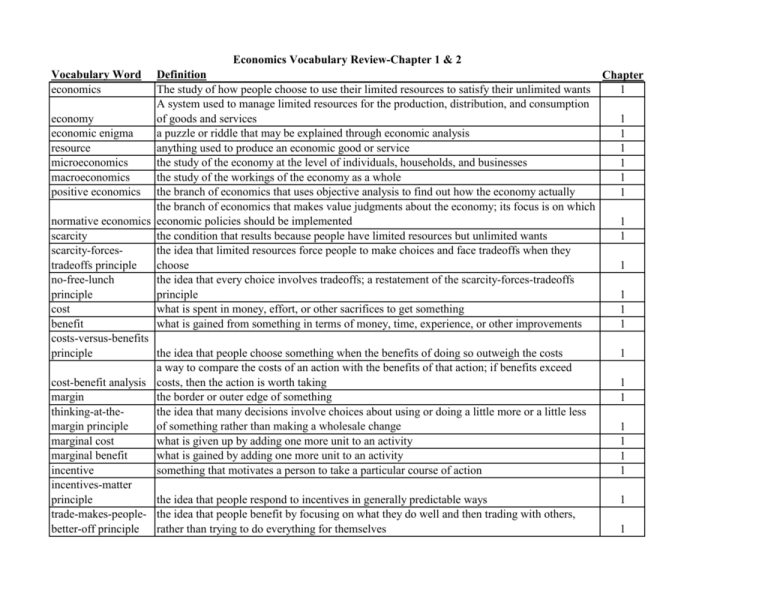
Economics Vocabulary Review-Chapter 1 & 2 Vocabulary Word economics Definition Chapter The study of how people choose to use their limited resources to satisfy their unlimited wants 1 A system used to manage limited resources for the production, distribution, and consumption economy of goods and services 1 economic enigma a puzzle or riddle that may be explained through economic analysis 1 resource anything used to produce an economic good or service 1 microeconomics the study of the economy at the level of individuals, households, and businesses 1 macroeconomics the study of the workings of the economy as a whole 1 positive economics the branch of economics that uses objective analysis to find out how the economy actually 1 the branch of economics that makes value judgments about the economy; its focus is on which normative economics economic policies should be implemented 1 scarcity the condition that results because people have limited resources but unlimited wants 1 scarcity-forcesthe idea that limited resources force people to make choices and face tradeoffs when they tradeoffs principle choose 1 no-free-lunch the idea that every choice involves tradeoffs; a restatement of the scarcity-forces-tradeoffs principle principle 1 cost what is spent in money, effort, or other sacrifices to get something 1 benefit what is gained from something in terms of money, time, experience, or other improvements 1 costs-versus-benefits principle the idea that people choose something when the benefits of doing so outweigh the costs 1 a way to compare the costs of an action with the benefits of that action; if benefits exceed cost-benefit analysis costs, then the action is worth taking 1 margin the border or outer edge of something 1 thinking-at-thethe idea that many decisions involve choices about using or doing a little more or a little less margin principle of something rather than making a wholesale change 1 marginal cost what is given up by adding one more unit to an activity 1 marginal benefit what is gained by adding one more unit to an activity 1 incentive something that motivates a person to take a particular course of action 1 incentives-matter principle the idea that people respond to incentives in generally predictable ways 1 trade-makes-people- the idea that people benefit by focusing on what they do well and then trading with others, better-off principle rather than trying to do everything for themselves 1 Economics Vocabulary Review-Chapter 1 & 2 Vocabulary Word market markets-coordinatetrade principle Definition an arrangement that brings buyers and sellers together to do business with each other the idea that markets are usually the best way to coordinate exchanges between buyers and sellers Adam Smith’s metaphor to explain how an individual’s pursuit of economic self-interest can promote the well-being of society as a whole invisible hand future-consequencescount principle the idea that decisions made today have effects in the future law of unintended the general observation that the actions of people and governments always have effects that are consequences not expected or intended a method of rational inquiry with six steps: (1) posing a question, (2) researching the question, (3) developing a hypothesis, (4) conducting studies and collecting data, (5) analyzing the data, scientific method and (6) evaluating the hypothesis data actual information, often in numerical form graph a visual representation of the relationship between two sets of data variable a quantity that can vary, or change axis one of two perpendicular lines in a coordinate system, used to locate a point in space curve a line representing data points on a graph simplified representation of reality that allows economists to focus on the effects of one economic model change at a time rational-behavior model the idea that people behave in ways that are based on reason and self-interest the assumption, used in economic models, that all factors other than those being considered Ceteris paribus remain the same; from a Latin expression meaning "other things being equal" good a physical article that has been produced for sale or use service work done by someone else for which a consumer, business, or government is willing to pay shortage a lack of something that is desired input a resource used in the production process; also known as a factor of production the resources used to produce goods and services. Economists define these resources as land, factors of production labor, and capital output the goods or services generated by the production process production equation a formula used to represent the production process: land + labor + capital = goods and services Chapter 1 1 1 1 1 1 1 1 1 1 1 1 1 1 2 2 2 2 2 2 2 Economics Vocabulary Review-Chapter 1 & 2 Vocabulary Word entrepreneurship entrepreneur land perpetual resource renewable resource nonrenewable resource labor human capital correlation financial capital physical capital capital goods capital productivity utility opportunity cost marginal utility negative utility Definition Chapter the willingness and ability to take the risks involved in starting and managing a business 2 a person who assembles and organizes the resources necessary to produce goods and services 2 all the natural resources, including energy, that are used to produce goods and services; one of the factors of production 2 a natural resource that is widely available and in no danger of being used up; examples include sunlight and wind 2 renewable resource: a natural resource that, with careful planning, can be replaced as it is used; examples include forests and fresh water 2 a natural resource that cannot be replaced once it is used; examples include oil and coal the time and effort people devote to producing goods and services in exchange for wages; one of the factors of production the knowledge and skills people gain from education, on-the-job training, and other a relationship between two factors, pieces of data, or other variables money used for investment or production the manmade objects—tools, machinery, buildings, and other goods—used in production; also called capital goods the manmade objects—tools, machinery, buildings, or other fabricated goods—used in production; also called physical capital the tools, machines, and buildings used to produce goods and services a measure of the efficiency with which goods and services are produced, stated as a ratio of output per unit of input the pleasure, satisfaction, or benefit a person receives from consuming a product or service or from taking an action opportunity cost: the value of the next best alternative that is given up when making a choice; a measure of what you must give up to get what you want the extra satisfaction or pleasure achieved from an increase of one additional unit of a good or service a lack of pleasure or satisfaction from consuming a product or service or taking an action; the opposite of utility 2 2 2 2 2 2 2 2 2 2 2 2 2 Economics Vocabulary Review-Chapter 1 & 2 Vocabulary Word law of diminishing marginal utility production possibilities frontier production possibilities curve economic efficiency Definition the general observation that as the quantity of a good or service consumed increases, the benefits for the consumer of each additional unit decrease a simple model of an economy that shows all the combinations of two goods that can be produced with the resources and technology currently available a graph showing the combinations of two goods that can be produced with a given set of resources the result of using resources in a way that produces the maximum amount of goods and Chapter 2 2 2 2




